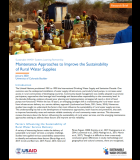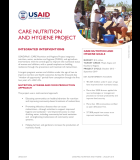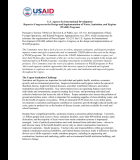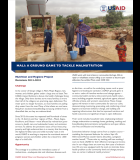Behavior Change Communication/Social Marketing (SBCC/SM)
This grant activity will strengthen Malians’ ability to lead healthy, productive lives by promoting malaria prevention and treatment, good nutrition and hygiene practices as well as reproductive health behaviors like family planning. Pairing social and behavior change communication with social marketing, the initiative will inspire households to acquire healthy behaviors and give them access to life-saving health products.
This new program emphasizes collaboration at every level. The Johns Hopkins Bloomberg School of Public Health’s Center for Communication Programs (CCP) team will work closely with Malian partners to foster communication between couples as well as to build strong mentoring relationships between indigenous NGOs and high-level technical assistance providers. What’s more, marketing of family planning and other products, as well as new health services, will be tied together with a common branding platform. The project will advocate for the private sector to play an important role in distributing a wide array of products and services as well.
Grant activity includes working closely with a successful Malian NGO to build an independent organization that will lead SBCC and social marketing efforts in Mali after the project is complete.
Activity Description
Women have low status in Malian society, a condition that results in poor health outcomes. When men and women are involved in community dialogues where health problems and the gender and social norms that facilitate them are discussed, health outcomes—and gender dynamics—improve. The SBCC/SM project will facilitate dialogue at all levels around family dynamics, enabling Malians to discuss, reflect and adopt new norms that will support new behaviors over the long term.
Communication tools, including videos of Malian men demonstrating gender transformative behaviors and attitudes such as cooking or caring for children, will be screened and discussed in community forums. These will lead to constructive dialogue about gender and decision making and embrace a set of behaviors and beliefs that lead to healthier outcomes. This transformation will be supported by neighbors, community structures and national policies.
Media, including interactive radio programming, a couples’ game show and a “micro-series” television comedy, will promotethe project’s objectives on a national level.
“Champions of change” — celebrities, religious leaders, traditional leaders and local public opinion influencers — will be recruited for these campaigns to increase political and popular support for transforming gender norms and health-related behaviors.
Expected Outcomes
- Enhanced Adoption of Key Health Behaviors; Increased demand for and use of high-impact services and health products at the community and household level in the intervention areas of USAID
- Demonstrated ability to conduct research and design, test, implement and evaluate CSCC and MS activities
- Increased availability of high-impact health products from social marketing and expanded non-public services in geographic target areas





